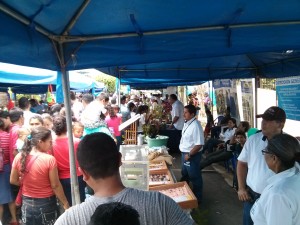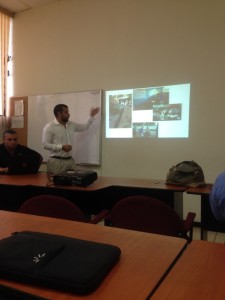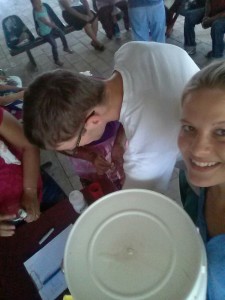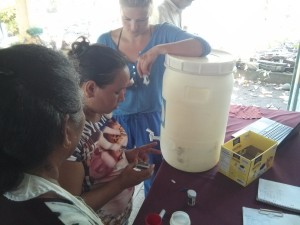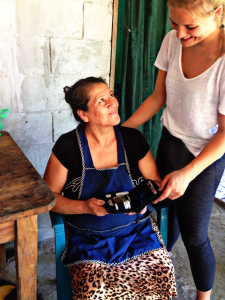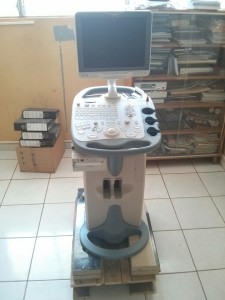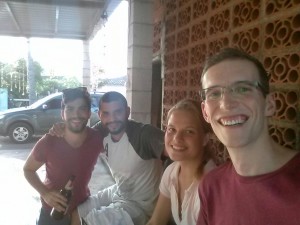First of all, sorry for the delayed blog post. Two weeks have passed now since we have arrived in El Salvador on August 11 in the evening. Two weeks in which a lot of things happened, a lot of them interesting and new to us.

We, that is Lucy Bischofsberger and Franz Herrmann, 4th and 5th year medical students from Gießen, came to El Salvador with the intention to donate a used ultrasound scanner from Germany to the Unidad de Salud in Cara Sucia. This is the next bigger medical institution for the patients of El Zapote with 4 doctors, where for example blood counsils are done. All further diagnostics are done in the hospital of Sonsonate, a town of 50,000 that is a three-hour bus ride away from El Zapote. The ride hast to be paid by the patients themselves. Therefore, many people can not afford to go there. The UFH members were convinced that having ultrasound in Cara Sucia would be an improvement for the patient health care, especially by avoiding unnecessary hospitalization because with ultrasound it is easier to distinguish between potentially dangerous conditions and harmless diseases. Also you can estimate the gestation age better than by calculating or palpating the height of the fundus of the uterus. The first days we stayed with the family of José, the doctor (last year student) of El Zapote in Santa Tecla, because our ultrasound scanner wasn’t to arrive until Wednesday 17th. They were very welcoming and helped us to adapt to our new environment. On our second day José and Leonie arrived from El Zapote and we were lucky to get a report of her 6-week stay a the Unidad in El Zapote, most importantly about her diabetes project. She stayed with us for another few days and joined us to our first meeting in the hospital of Ahuachapan to discuss the plans where to install the scanner and train the personnal. There we met the responsible doctors of the departamento of Ahuachapan in which El Zapote is situated (there are 14 departamentos = states in the country). They were very interested in our suggestion to train some doctors in abdominal sonography, showed us the hospital and the setting in which our classes could take part as well as an accomodation for us in the hospital. We agreed to pick up our scanner and start classes the following Monday in the hospital of Ahuachapan as well as in the Unidad de Salud in Cara Sucia. We were relieved that everything was arranged that quickly and were looking forward to start our course. Unfortunately, things didn’t turn out as easy as they appeared to be. In the evening of the same day José received a phone call were he was told we could neither bring our scanner to Cara Sucia nor teach any doctor there. Instead, we should teach only the doctors in Ahuachapan and also leave our donation there. Unfortunately we found out that patients from El Zapote are not sent to Ahuachapan but instead to Sonsonate because it is easier to reach. However, Sonsonate belongs to a different departamento. On top of that, Ahuachapan and Sonsonate already have sonography scanners and we did not see the need for another one. Therefore we had to think about a new solution. This kept us busy for the following time. And we decided to convince them of our plan by praparing a presentation about our project where we indroduce ourself, the organization UFH and the programm of the ultrasound class as well as the benefits.
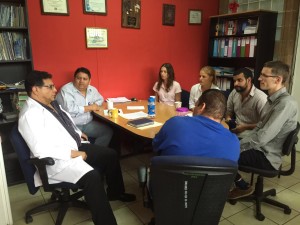
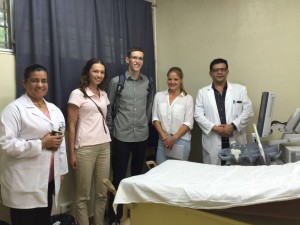
18.-19.08.2016
In the meantime José also had to go to work in la Unidad de El Zapote so we joined him to go there for 2 days. It was interesting to get to know the place and the people where the project has once started. We continued with the weekly diabetes patient meeting on Friday morning to check their glucose level and to tell them about the importancy of daily activities and sports. So we decided to devide the group and each of us went for a 20 min excercise with the patients that fits to their age and is also easy to include in their daily work. They were gratefull and interested in the programm and obviously had fun when they have seen that both of the german students were the ones sweating the most because we were not at all adapted to the high humidity there.
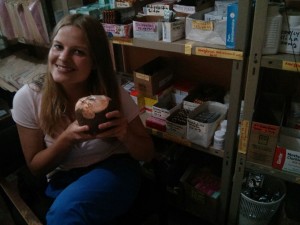
20.08.2016
Festival del Buen Vivir
Saturday José spontaniously got an invitation to the „Festival del Buen Vivir“ in Guaymango which is a 2 hours drive from Barra de Santiago and we decided to join him. The festival is about giving free consultations to the inhabitats. Not only about that also about enlightenment of different topics of health care for example going to screening examinations, healthy food, water purification and lots more. Over all the president of the country came to speek to the people there. We joined José and a collegue of him during the consultation in classrooms of a school where 15 doctors per room were seeing patients every 10 min to prescribe medicine or to refer them to specialists who were also attending the festival in other classrooms. This seemed a bit bizarre, because patients were given medication without much of an anamnesis or physical examination due to the fact that the doctors only had a stetoscope and no privacy. We were told many patients use this event to get medicine for free (above all antibiotics). Missuse of antibiotics is a severe problem here, because Patients expect to receive them if they go to the doctor for any reason. Thats why doctors also hand them out when they don’t want to argue. Also, you can buy many antibiotics (for example Cephalosporins) in the streets just like street food whereas the Unidades de Salud sometimes don’t have a sufficient variety of antibiotics to treat bacterial diseases as they are supposed to be. This all leads to a spreading of antibiotic resistance in the country.
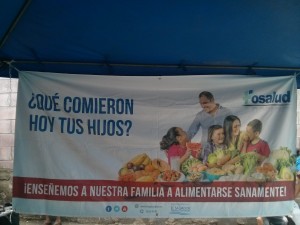

22.08.2016
The El Salvadorian Customs
After all the struggles we had so far with the organisation, picking up the ultrasound scanner from the airport would be an important step forward in our project. Our donation was scheduled for August 17. After some mails and phone calls we found out where we can pick up our ultrasound device. A friend of José joined us with a pickup and we arrived at the airport at around 12:30 quite excited to receive the box that travelled over 3 continents. The sending company in Germany was DB Schenker, the receiving company in San Salvador was Avianca cargo. The sending process and paperwork that was done previously to our travel was not very complicated. The transportation and the material for the wooden box cost around 750 €. We would like to thank everyone that contributed to that! At the airport we had to go from the customs office to the Avianca office, back to customs and again to Avianca several times to receive documents and getting them signed and sealed. After some time we could procede to the storage area where our box should be checked and given to us. Sadly we lost a lot of time waiting in all the mentioned areas and the custom officers finally didn’t have any (!) tools to open our box to check the content. Luckily a man was found that had a crowbar so they managed to open it. Then everything got a little chaotic because they seemed to be closing the airport at 4:30pm. After paying the custom (167 Dollars) they brought the box to the counter to tell us we could not take it with us because the weight in the airway bill was not correct and there was no time left to pay any fee. So we had to return to Santa Tecla with an empty car. The next day we returned early and wanted to pay the overweight fee. After another two hours of waiting we were told that there was no fee and the mistake was done by the airport. We didn’t ask any more questions about it and were happy to finally load the box in the car and leave.


So far the box is stored at the house of Josés family where it will stay unil we are sure that the course will be realized for the patients of la Unidad de El Zapote in Cara Sucia. What we have learned so far ist that calmness and patience are valuable goods in this country. And for Germans it is not always easy to adapt to that attitude
25.08.2016
Another important meeting
This time we were supposed to meet the people oft he Ministery of Health in Santa Ana. Some of you might be wondering why we didnt manage to put the sonar scanner in the right place and start with the course yet. But things here are way more complicated than they seemed to be back in Germany. The main problem ist the legal import and registration oft the machine that has to go through all instances of the health care system in the country. Furthermore to make them believe in our project (we are only 2 medical students and not even doctors) we were supposed to present the introduction presentation we have prepared in the last week. The main problem is that even though our spanish skills are „ok“ it is hard to discuss on such a high level with important people to convince them of a revolution of their primary health care. Normally general practioners in El Salvador do not do sonar examinations at all, so inventing this course is a big deal.
As far as we know the meeting went well (that is the information at the moment, but as you have seen things can always change). So right now we need to get the donation letter fixed in an official correct way. Therefore we had to use once more the connection of friends here who know how to write such an important document to preserve the scanner that we brought from corruption. This letter will be hopefully finished on Wednesday next week (31.08). As soon as we have the letter we will fix the last settings with the Ministery of Health in Santa Ana (hopefully on Thursday). Up to now we have to wait for the next paper works before we can figure out how the sonography class will finally work out. And again there is a need of patience and calmless. What we are doing at the moment is to make the best out of our difficult unexpected situation. We try to get to know the country and the people as well as how the Unidad de El Zapote and the whole Health Care System works. And besides all the doubts we know that we met amazing people here so far without them we would have failed even after the first days.

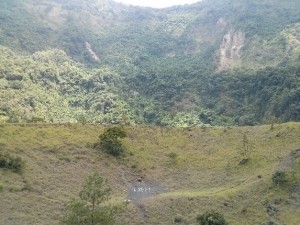
New month, new steps forward
When we started to sum up the last important events for our new blog post, we realized how fast time passes by here and we had to think about final decisions.
At the end of August we knew that we just had about 10 days to move the ultrasound scanner to Cara Sucia, the place where it belongs to and give a short introduction to the doctors there. We realized that it will not be possible to teach them the full course that we have planned and already started to translate in Spanish because there will not be enough time left.
So we came to the conclusion that it will be the best to move the scanner as soon as possible to la Unidad in Cara Sucia to have it at least in the right place when we will leave.
Therefore we set up a meeting on Wednesday 31 with Selina Menendez a member of UNICEF El Savador who is aware of our situation and struggles and knows how to write donation papers in an offical way.
29.-30.08.16
Before we went to the meeting we joined Jose for two days in El Zapote. We had a look at the nutrition center that is right next to the Unidad and also organized by the Ministery of Health. Two women care from 8.00- 12.30 from Monday to Friday for about 10 to 15 kids who are too young for school. These kids are examined by the doctor and are send to the nutrition center because their familys are unable to care about them either because of working or because of having too less money to afford proper meals.
In the nutrtion center the kids get 2 meals per day and their weight is checked every month. The Mayor of the district pays 50 Dollars per month to buy all the groceries and utensils. Because of the financial shortage all the meals contain maize or rice as well as milk in form of pulver mixed with water. To improve the meals the stuff and people from the village bring vegetables and fruits on their own donation base every day. That day we found out that the gas bottle for the stove was empty for a few weeks so the stuff had to cook on open fire because the money was used for the food rations. Therefor we decided to buy a new gas bottle refill from the UFH donationmoney for 10 dollars. This bottle will last for about 3 month. For the further bvmd students it would be also interesting to invest some time in the nutrition center as there is always a need for small things and help.
The other day in El Zapote we used to join the two Promotores de Salud to do some home visits for the diabetes patients who didnt had the chance to go to the last friday meetings in the Unidad. We checked the glucose level and told them about the importancy of diet, exercise and need of a constant medical treatment as well as about the study that Jose and Leonie have planned with the new glucometers.
It was interesting to see their living conditions and learn something about their eating habits. Furthermore we got to know the difficulty of teaching them what their diabetes disease is about as the majority did not went to school and some do not know how to read or write.
We had one 33 year old patient with a glucose level of 631 and a known renal failure that we decided to take with us to the hospital after the consultation because she first refused to go on her own. We dropped her in the hospital of Sonsonate on our way back to the capital on Tuesday afternooon. They stabilized her with insuline and discharged her with Metformin and Glibenclamide.
In the evening at the house of Joses family we received another bad news (this time not about the ultrasound scanner): The metformin in la Unidad is about to get finished and the Ministery of Health is not able to send a next delivery for an unknown time. Which means that the designed study of Jose and Leonie will not be able to be completed because the paticipants have to be under ideal conditions like an access to their medicine without paying for it. This is not possible when the state does not sent metformine to the Pharmacy in la Unidad.
We spend the night thinking about how to get the Metformine.
Josés options included to buy it on his own for costs about 500 dollars, to ask other clinics for help (but they are also running out of the medicine) or to get a donation. So UFH especially Lukas Hermann from Germany is now trying to organize a delivery by Medeor, a worldwide cooperating organization that is sending medicine for really low costs. Christina from UFH also used this orgaization when she came here.
Wed, 31.08.2016
The next day we went to the meeting with Selina at UNICEF. It was an honour to get to talk with that high authorities here and they were confident and willing to help us to get the donation letters that we need done in a short time. As soon as we have these papers the Ministerz of Health told us that it wont be a problem to bring the machine to Cara Sucia.
Thursday Jose was spontaneously called to cover la Unidad in Garita Palmera also part of the depatamiento Ahuachepan where the doctor is on maternity leave. There we had the chance to improve our medical knowlege and examinations especially in pregnancy care. It was interesting to get to know another Unidad and the conditions under which the doctor there have to work. For example all the blood pressure cuffs were broken. Therefore unfortunately eclampsia could not be excluded.
Friday we came back to El Zapote for the weekly Diabetes meeting to repeat once again the contents of the last meetings, to calculate to glucose level and to check how many metformine blisters the patients have left to calculate the need.
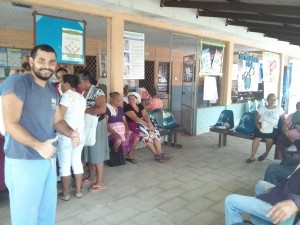
The donation letters were supposed to be finished by Monday so we organized a transport for the ultrasound scanner or wednesday 07.09. to Cara Sucia. Therefor we met with Edgar who is a friend of Lukas and helped him with the ECG transport last time he was here. Edgar is staying in the capital but he is fascinated by the UFH project and always willing to help. We are really thankful for his efforts!
For the upcoming week we decided to split up to optimize our working results. Franz will stay in Santa Tecla to finish the transport organisation and Lucy is going to join the Promotores in la Unidad de El Zapote.
So each of us is going to sum up his impressions for 05.09. - 07.09.
Lucy:
We arrived Monday morning early in El Zapote so I was able to join Zuleyma one of the Promotores who is visiting patients in El Povenir (4 km away from El Zapote) with her motorbike. We visited about 20 Patients mostly pregnant women on Monday and the following day. Therefore we brought a blood pressure cuff, combur sticks and the glucometers. The cuff as well as the glucometer are donations from UFH and its the first time the Promotors are able to use them on their own on home visits. All these parametes as well as the effect of antibiotics in UTI controlled by the combur sticks are reported to the doctor at the end of the day. We also checked the living conditions for example the purification of the water and gave advice for intim hygiene. Moreover we had two kids who were bitten by dogs where we had to check the vaccination status of the patient and the dogs as well (the promotores here also vaccinate the dogs for rabies) After we visited the regular patients I choose to visit once again some diabetes patients who weren´t able to join the reunion last friday to report about the last informations and to check their glucose and left blisters. I also had the chance to observe their cooking and eating habits by having a look at their kitchen or dishes.

The fact that most of the people here do not earn mor ethan 150 dollars per month and that the local supermarkets (tiendas more likely to be a kiosk) do not offer a big varietz of food exept of sweets and chips complicate the need for a good diet for diabetes patients here. The advice to eat more fruits or vegetables is easier to be said than to be realized. But eventhough we could see an improvement of the glucose level in some patients that take their daily exercise serious and try to reduce their used amount of sugar (as black coffee is the most common drink here nearly everyone is adding sugar to it, also the juices one can buy in the tiendas for a small amount of money like 30 cents contain more sugar than a coke). Working with the Promotora was the best chance to get to know the circumstances of living here and feel the patients needs as mine.

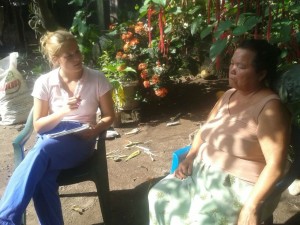
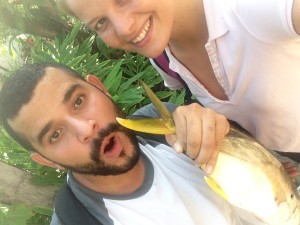
Franz:
On Wednesday, Sep 7, we brought the machine to Cara Sucia. Thanks to Rene, we had a suitable car that fitted it and protected it from rain. We started in the morning. Because we had little information from the receiving side (as always) we planned to bring it directly to Cara Sucia. The day before Jose got a call from the doctors that should have organized the delivery with us. They told him we should come to Santa Ana first, sign documents that will confirm its use for the Unidad in Cara Sucia and leave it in the central storage unit from where they will bring it to Cara Sucia. Since this information reached us the day before (and not even us directly) we had little trust in that and decided to bring it to Cara Sucia directly. Half the way there on the Highway, Jose called Rene and me again saying that we should call the doctors again, it would be very important. So we stopped at a gas station, wrote some emails and had several phone calls in which we demanded that if we bring the machine to the storage to register it we will also transport it to Cara Sucia the same day. This was not the cooperation we hoped for but at this point we didn't really trust in anything that was suggested. Plus, it was two day before leaving so we wanted to secure the location of the machine in Cara Sucia. The following went really quick: We entered the storage unit, showed the administration guy our self written contract that they copied. Then he said we can proceed to Cara Sucia, someone has to send them two copies of the signed contract and then they will register it and put a code number on it. That all took less than 20 minutes. (and we wonder why this needed 4 weeks of frustrating communication with them...). One hour later we arrived in Cara Sucia, where everybody was excited to unload the box. We signed the contract with the doctor of the unit and he invited us the next day to explain its use.


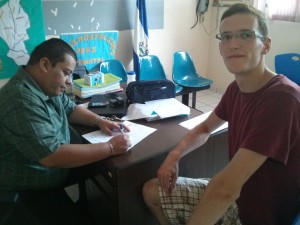
Our departure
Nothing much happened after the last blog entry. There were two days left to somehow finish installing the ultrasound machine and there was still „hope“that in the end it would serve as envisioned. But sadly we had to leave before.
In the morning of Thursday, September 8, we discovered a technical problem: The cable of the machine doesn’t fit in the 220V-socket. We had an adapter to connect the european plug to the 110V sockets, but we didn`t know that the 220V ones are different. That was unfortunate, I (Franz) was mad at myself because I didn’t ask about this before…
What went wrong?
Last minute we tried to find such an adapter in one of the hardware stores in Cara Sucia without success. Unfortunately we had to understand that the original project plan, as confirmed before our stay and during the various meetings in El Salvador with all involved persons, was not followed with motivation by the El Salvadorian authorities. The adapter is just a little example: Months before our arrival we asked them by mail if they want to use the 110V (which is standard in EL Salvador) or the 220V sockets. Without any problems we could have added a transformator to the machine in Germany that let you use the 110V electric system. After visiting the Unidad it was clear to us that this would have been the most convenient solution. Instead we were told that using the 220V-System would be no problem.
In conclusion, it was very disappointing that no signs of effort, support or at least willingness for cooperation was shown by health authorities of Cara Sucia, the state of Ahuachapan or the ministry of health. It could have just been that our whole idea was just a naive idea of students- but during all our meetings we were always told how thankful everybody was and how great this project would be for doctors and patients. Scenes like in one of our first photos in the blog when we met in Ahuachapan. However we experienced that words can not always be taken for granted in our conversations. We didn’t understand why they agreed and approved the plan, but afterwards didn’t follow the steps we discussed in advance. Meetings were cancelled the evening before, we were invited to appointments where nobody showed up; on the last day we were even asked to stay the night in the Unidad to cover a night shift after we have been waiting in Cara Sucia all day and called the person who wanted to see us several times. It was sad and frustrating to be treated that way. It would have helped very much to better know the working and communication habits of the local health authorities in advance to better plan and organize the implementation of the project.
These are the most important lessons learned: It would have been helpful to clarify the desired outcomes of the project in advance. As this is not always possible in between continents, there is a great necessity for flexibility, patience and tolerance. Until now, we didn't get any feedback on the potential benefits, hazards or outcomes of the project. It should work with a new adapter, maybe they will organize training for their doctors in Sonsonate or San Salvador, maybe patients will be checked for gall stones or pregnancy in half a year, we know for the best. The conditions seem unsteady, and the style of thinking and working appears difficult to us, but maybe they will do… we will keep in touch with them to make the best possible happen.
We really want to thank José, his family and friends, for supporting us the entire time. Without them, we couldn`t have done much at all and we are glad to have some new friends. The results of this project have to be considered when planning the next stay in March. Somehow we are sad to leave our new friends now but also looking forward to future travels and adventures.
See you soon.
